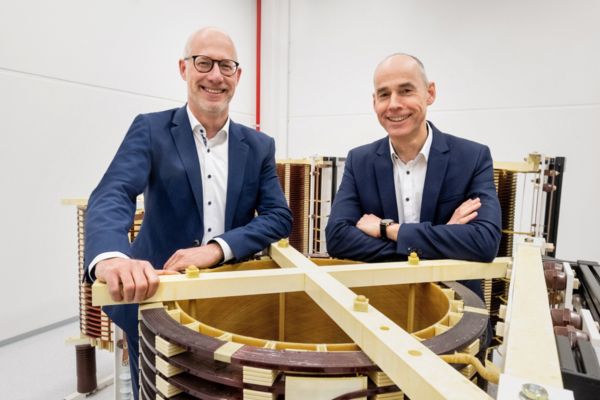DC grids: the future of energy efficiency and sector coupling E-mobility, solar systems, and battery storage systems are revolutionizing industry.

Brief summary
DC grids play a crucial role for the future of energy efficiency and sector coupling in industry. This article highlights the importance of e-mobility, solar systems, and battery storage systems for the revitalization of direct current in industrial applications. It also looks at the developments at Phoenix Contact and the dedicated work of Dr. Martin Wetter and Dr. Christian Helmig, who have been driven by the fascination for direct current since their studies. In addition, the article discusses the challenges and opportunities offered by DC grids in industry.
The beginning of an electric revolution
The return of direct current to industry is closely linked to e-mobility, solar systems, and battery storage systems. These technologies play a crucial role in energy efficiency and the sustainable use of limited resources. They serve as an “energy bloodstream” for sector coupling. Dr. Martin Wetter and Dr. Christian Helmig, as outstanding experts, are driving forward the development of products and solutions in this area at Phoenix Contact.
The passion for direct current
“The fascination for direct current began for Dr. Martin Wetter and Dr. Christian Helmig right back when they were studying. The experimental lectures in the high-voltage laboratory aroused their interest in this technology. This enthusiasm continues to accompany them to this day. Martin Wetter even received his doctorate at the chair to which the laboratory belonged, and where he also met Christian Helmig. Their shared passion for direct current finally brought them back together in 2023, when they both worked on DC projects in different Business Areas at Phoenix Contact.
“At the end of the undergraduate program, there was an experimental lecture in the high-voltage laboratory. Then I decided that I would like to continue working with these machines later”, says Dr. Martin Wetter about his beginnings. His colleague Christian Helmig adds, “I was looking forward to the lecture for weeks. We made some serious sparks in the high-voltage cage”.
The challenges and progress
Both experts agree that there are still challenges that need to be overcome. DC technology cannot yet be made comprehensive because there is still a shortage of products and system components. Although many components are already DC ready, areas such as grid management need to be improved. An active closed-loop control system for load management is necessary, and although the series release is still pending, work is already being carried out on the control algorithms.
Partnership to set standards
Phoenix Contact sees itself not only as a hardware manufacturer for DC grids, but also as a partner for their design. The close cooperation in overarching research projects, including with competitors, is proof of the commitment to driving forward DC technology in industry. This commitment is part of a larger goal, namely to secure Germany’s technological leadership in the global automation market. Both experts agree that companies set the standards worldwide.
We are jointly committed to ensuring Germany’s technological leadership in the global automation market. It is the companies that set global standards.
The future of DC technology
Although there are still some hurdles on the way to the widespread use of DC grids, the future is promising. Planning offices and consultants play a decisive role, as there are currently only a few experts who can provide advice on direct current. Phoenix Contact not only strives to produce hardware for DC grids, but also to act as a partner for their design, to share experiences in working with DC grids, and to promote the acceptance of this future technology. Dr. Martin Wetter is even represented on the board of the Open Direct Current Alliance, which is committed to the comprehensive establishment of direct current technology with a focus on resource protection and carbon neutrality.
As more people start talking talk about it, the more attention it gains, which in turn results in more investments being made in this future technology. DC technology is an important piece of the puzzle in the energy revolution.
Connect with our experts

More posts

Green energy with security
Hauke Kästing and Phoenix Contact protect wind turbine generators against cybercrime.

Combatting cybercrime with full wind power
With effective security solutions, Phoenix Contact protects wind turbine turbines and other renewable energy generators against cybercrime.

Coupling of factory and building
The Emalytics Automation building management system harmonizes data formats and intelligently networks sectors.

